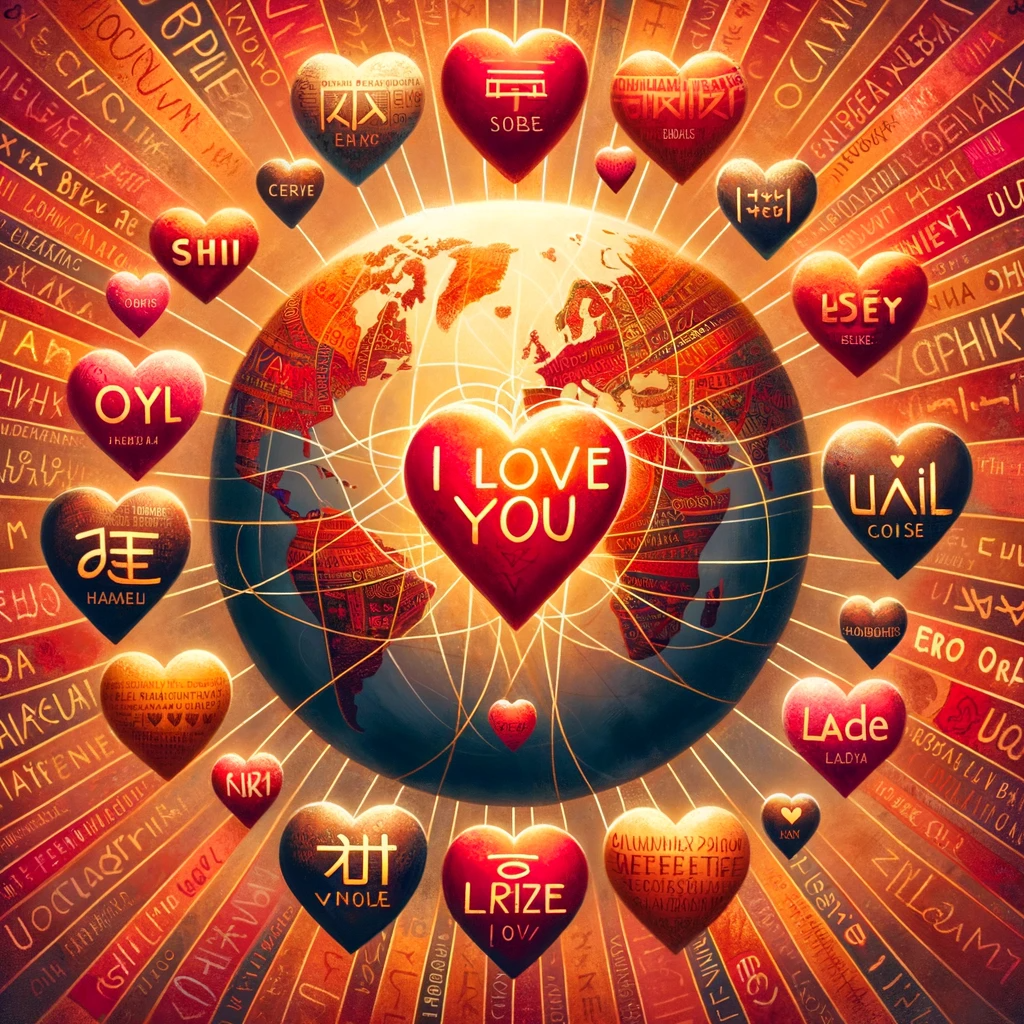Love, a timeless and universal emotion, transcends all boundaries. It’s fascinating how three simple words, “I love you,” can hold so much power and emotion in every language. Let’s embark on a linguistic journey, exploring how these three words resonate across different cultures and languages.
1. Spanish: “Te Amo”
In the language of passionate flamenco dancers and colorful fiestas, “Te Amo” is a profound expression of deep love. The Spanish language is known for its expressive and emotive quality, making “Te Amo” a fervent declaration.
2. French: “Je t’aime”
Ah, French, the language of romance! “Je t’aime” is as elegant and classic as the streets of Paris. In a language known for its sophistication, these words are a chic expression of affection.
3. Mandarin: “我爱你 (Wǒ ài nǐ)”
Mandarin, with its tonal melody, lends a unique charm to expressing love. “Wǒ ài nǐ” carries with it a sense of sincerity and depth, reflective of the rich cultural heritage of China.
4. Arabic: “أحبك (Ahabak)”
Arabic, a language of poetic nuance and rich history, expresses love in a deeply resonant way. “Ahabak” is not just a statement; it’s a lyrical confession of the heart.
5. Hindi: “मैं तुमसे प्यार करता हूँ (Main tumse pyar karta hoon)”
In the diverse land of India, where love is often celebrated in Bollywood songs, “Main tumse pyar karta hoon” for men or “Main tumse pyar karti hoon” for women, captures the essence of Bollywood romance.
6. Italian: “Ti Amo”
Italian, the language of operatic grandeur and rich cultural artistry, conveys love as passionately as its famed operas. “Ti Amo” is more than a phrase; it’s an emotional aria.
7. Japanese: “愛してる (Aishiteru)”
The Japanese language, known for its subtlety and depth, expresses love in a way that is both gentle and profound. “Aishiteru” carries with it layers of emotion and respect.
8. German: “Ich liebe dich”
In German, a language known for its precision, “Ich liebe dich” is a straightforward, strong declaration of love, reflecting the depth and seriousness of feeling.
9. Portuguese: “Eu te amo”
Portuguese, with its lyrical and soulful sound, particularly in the Brazilian dialect, turns “Eu te amo” into a melodious expression of heartfelt passion.
10. Swahili: “Ninakupenda”
In Swahili, a language spoken across various African countries, “Ninakupenda” is an expression of love that transcends cultural barriers, embodying a deep connection of the heart.
11. Russian: “Я люблю тебя (Ya lyublyu tebya)”
In Russian, a language as vast and deep as the country itself, “Ya lyublyu tebya” carries a heartfelt and earnest depth of feeling.
12. Greek: “Σ’ αγαπώ (S’ agapó)”
In Greek, a language with ancient roots, “S’ agapó” is a timeless expression, echoing through the ages.
13. Turkish: “Seni seviyorum”
Turkish, with its unique blend of Asian and European influences, turns “Seni seviyorum” into a melodic and heartfelt confession.
14. Korean: “사랑해 (Saranghae)”
In Korean, “Saranghae” is a sweet and simple declaration, often heard in the popular K-dramas that have captured hearts worldwide.
15. Dutch: “Ik hou van jou”
Dutch, with its direct and honest demeanor, offers “Ik hou van jou” as a genuine and straightforward expression of love.
16. Swedish: “Jag älskar dig”
In Swedish, “Jag älskar dig” carries a sense of profound affection and sincerity, reflective of the deep connections valued in Swedish culture.
17. Polish: “Kocham cię”
Polish, a language with a rich history, conveys love deeply and earnestly with “Kocham cię.”
18. Thai: “ผมรักคุณ (Phom rak khun)” for males, “ฉันรักคุณ (Chan rak khun)” for females
In Thai, a language known for its politeness levels, these phrases offer a respectful and tender expression of love.
19. Filipino: “Mahal kita”
Filipino, known for its warmth and friendliness, says “Mahal kita” with a sense of deep affection and commitment.
20. Hebrew: “אני אוהב אותך (Ani ohev otach)” for males, “אני אוהבת אותך (Ani ohevet otcha)” for females
In Hebrew, these phrases express love in a language that’s both ancient and modern, carrying a sense of enduring passion.
21. Norwegian: “Jeg elsker deg”
Norwegian, with its melodious and gentle sound, offers “Jeg elsker deg” as a warm and sincere declaration.
22. Czech: “Miluji tě”
In Czech, “Miluji tě” is a heartfelt and straightforward expression of love, embodying the sincerity of emotions.
23. Hungarian: “Szeretlek”
Hungarian, a language distinct in its origins and sound, provides “Szeretlek” as a unique and passionate expression of love.
24. Indonesian: “Aku cinta kamu”
Indonesian, with its rhythmic and gentle flow, says “Aku cinta kamu” with simplicity and depth.
25. Romanian: “Te iubesc”
Romanian, a language with Latin roots, offers “Te iubesc” as a passionate and romantic expression.
26. Danish: “Jeg elsker dig”
In Danish, “Jeg elsker dig” is a tender and earnest way to express love, reflecting the depth of feeling.
27. Finnish: “Minä rakastan sinua”
Finnish, known for its unique and complex structure, conveys love with “Minä rakastan sinua” in a profound and sincere manner.
28. Slovak: “Ľúbim ťa”
Slovak, a language rich in history and culture, expresses love with “Ľúbim ťa,” a phrase filled with warmth and affection.
29. Bulgarian: “Обичам те (Obicham te)”
In Bulgarian, “Obicham te” is a deeply emotional and heartfelt way to express love.
30. Vietnamese: “Anh yêu em” for males to females, “Em yêu anh” for females to males
Vietnamese, with its tonal nature, offers “Anh yêu em” and “Em yêu anh” as gender-specific expressions of deep affection.
31. Bengali: “আমি তোমাকে ভালোবাসি (Ami tomāke bhālobāsi)”
In Bengali, a language with poetic nuances, “Ami tomāke bhālobāsi” is an expression filled with deep affection and emotion.
32. Malayalam: “ഞാൻ നിന്നെ പ്രേമിക്കുന്നു (Njān ninne premikkunnu)”
Malayalam, known for its lyrical quality, conveys love with “Njān ninne premikkunnu,” a phrase that resonates with warmth and depth.
33. Zulu: “Ngiyakuthanda”
In Zulu, “Ngiyakuthanda” is a heartfelt expression, reflecting the rich cultural heritage of South Africa.
34. Welsh: “Rwy’n dy garu di”
Welsh, a language with Celtic roots, offers “Rwy’n dy garu di” as a unique and passionate way to express love.
35. Ukrainian: “Я тебе кохаю (Ya tebe kohayu)”
In Ukrainian, “Ya tebe kohayu” carries a sense of depth and sincerity, reflective of the country’s rich cultural tapestry.
36. Gujarati: “હું તને પ્રેમ કરું છું (Huṁ tane prem karuṁ chuṁ)”
Gujarati, spoken in the vibrant state of Gujarat, expresses love with “Huṁ tane prem karuṁ chuṁ,” a phrase filled with emotion and depth.
37. Latvian: “Es tevi mīlu”
In Latvian, “Es tevi mīlu” is a straightforward yet profound declaration of love, resonating with sincerity.
38. Lithuanian: “Aš tave myliu”
Lithuanian, a language of the Baltic region, conveys love with “Aš tave myliu,” a heartfelt and tender expression.
39. Icelandic: “Ég elska þig”
Icelandic, known for its unique and ancient heritage, offers “Ég elska þig” as a pure and simple declaration of love.
40. Nepali: “म तिमीलाई माया गर्छु (Ma timīlāī māyā garchu)”
In Nepali, a language spoken in the Himalayas, “Ma timīlāī māyā garchu” reflects a deep and sincere affection.
41. Kannada: “ನಾನು ನಿನ್ನ ಪ್ರೀತಿಸುತ್ತೇನೆ (Nānu ninna prītisuttēne)”
In Kannada, a classical language of India, “Nānu ninna prītisuttēne” conveys deep affection with a rich cultural undertone.
42. Catalan: “T’estimo”
Catalan, spoken in parts of Spain, expresses love with “T’estimo,” a phrase that’s both simple and profound.
43. Farsi (Persian): “دوستت دارم (Dooset daram)”
In Farsi, “Dooset daram” is a poetic and heartfelt way to say “I love you,” reflective of the language’s rich poetic tradition.
44. Estonian: “Ma armastan sind”
Estonian, with its distinct sound and rhythm, offers “Ma armastan sind,” a sincere and straightforward expression of love.
45. Swahili: “Nakupenda”
Swahili, widely spoken in East Africa, expresses love with “Nakupenda,” a phrase that resonates across multiple cultures and nations.
46. Basque: “Maite zaitut”
Basque, a unique language in Europe, conveys love with “Maite zaitut,” a testament to the language’s distinct identity.
47. Hawaiian: “Aloha wau iā ʻoe”
Hawaiian, a language of the Pacific, says “Aloha wau iā ʻoe” with a sense of warmth and deep personal affection, embodying the spirit of the islands.
48. Afrikaans: “Ek het jou lief”
In Afrikaans, spoken in parts of Southern Africa, “Ek het jou lief” is a tender and heartfelt way to express love.
49. Albanian: “Të dua”
Albanian, a language with ancient roots in the Balkans, uses “Të dua” to express love in a direct and powerful way.
50. Armenian: “Ես քեզ սիրում եմ (Yes kez sirum em)”
In Armenian, “Yes kez sirum em” is a profound and sincere expression of love, steeped in the rich history of the Armenian language.
As we conclude this global tour of love’s expression in 50 different languages, it becomes evident that love, in all its forms, is a profound and universal experience. Each language offers a unique lens through which love is perceived and expressed, yet the emotion remains constant in its depth and sincerity. Whether whispered under the starry skies of Nairobi or declared amidst the bustling streets of Barcelona, “I love you” remains a testament to the unifying power of love. This journey reminds us that, despite our diverse cultures and languages, our hearts speak a common language. Love, in its purest form, transcends all barriers and binds us together in the shared human experience. Let us cherish and celebrate this beautiful diversity, recognizing that in love, we find our greatest connection.

